Our society celebrates the varied configurations, beliefs, cultures, and values that are unique to the ever-changing family unit. The International Literacy Association’s Children’s Literature and Reading Special Interest Group presents new titles featuring characters from various family structures as they appreciate their relationships. The characters learn to value and respect traditions and forge a richer understanding about their lives. These literature selections can be woven across the curriculum to broaden students’ sense of self and understanding of others.
Ages 4–8
de la Peña, Matt. (2015). Last Stop on Market Street. Illus. by Christian Robinson. New York, NY: Putnam.
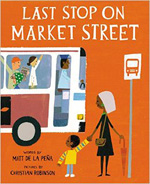 This picture book appears to be about riding the bus, city life, and intergenerational connections. It is indeed about all those themes, but it’s also about issues such as homelessness, food insecurity, and community involvement. The book opens with a cityscape as CJ and his Nana leave church and wait for the bus “in all this wet.” CJ seems to be complaining, but Nana reminds him they “got a bus that breathes fire.” Throughout the bus ride, Nana finds similarly poetic and philosophical ways to respond to CJ’s questions and concerns as they encounter a diverse array of riders. In the end, CJ and Nana arrive at their destination, making their way past the men, women, and children in line for a meal. The art and text in this book develop the relationship between CJ and Nana to highlight connections between city life and the natural world.
This picture book appears to be about riding the bus, city life, and intergenerational connections. It is indeed about all those themes, but it’s also about issues such as homelessness, food insecurity, and community involvement. The book opens with a cityscape as CJ and his Nana leave church and wait for the bus “in all this wet.” CJ seems to be complaining, but Nana reminds him they “got a bus that breathes fire.” Throughout the bus ride, Nana finds similarly poetic and philosophical ways to respond to CJ’s questions and concerns as they encounter a diverse array of riders. In the end, CJ and Nana arrive at their destination, making their way past the men, women, and children in line for a meal. The art and text in this book develop the relationship between CJ and Nana to highlight connections between city life and the natural world.
—LC
Jenkins, Emily. (2015). A Fine Dessert: Four Centuries, Four Families, One Delicious Treat. Illus. by Sophie Blackwell. New York, NY: Schwartz & Wade/Random House.
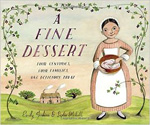 Children and adults alive with an interest in baking or a love of dessert will be drawn to this delightful book. Curricular connections related to history, nature, and science abound in this book about four parent–child pairs making blackberry fool. The repetition of the ingredients and the process crosses generations, but characters, interactions, and tools change along the way. The soft but detailed watercolor and ink (and blackberry juice!) illustrations contribute to the intimacy between parent and child that comes through in each vignette, with the father and son at the end offering a modern and endearing scene. A Fine Dessert would function well as a read-aloud or could be used as part of an inquiry-based unit. Both the author and illustrator provide notes, and the end matter also contains sources and a recipe for blackberry fool.
Children and adults alive with an interest in baking or a love of dessert will be drawn to this delightful book. Curricular connections related to history, nature, and science abound in this book about four parent–child pairs making blackberry fool. The repetition of the ingredients and the process crosses generations, but characters, interactions, and tools change along the way. The soft but detailed watercolor and ink (and blackberry juice!) illustrations contribute to the intimacy between parent and child that comes through in each vignette, with the father and son at the end offering a modern and endearing scene. A Fine Dessert would function well as a read-aloud or could be used as part of an inquiry-based unit. Both the author and illustrator provide notes, and the end matter also contains sources and a recipe for blackberry fool.
—LC
Rotner, Shelley. (2015). Families. Photographs by Sheila Kelly. New York, NY: Holiday House.
 In this nonfiction photo essay selection, simple text is coupled with outstanding photographs. The authors encourage readers to “engage in conversations about their families” to learn more about their backgrounds, traditions, and history. Photographs of diverse families are represented throughout the text. This book considers family makeup, structure, celebrations, and activities of different families and backgrounds. The last page includes the question “What about yours?” as a way to foster conversation and dialogue.
In this nonfiction photo essay selection, simple text is coupled with outstanding photographs. The authors encourage readers to “engage in conversations about their families” to learn more about their backgrounds, traditions, and history. Photographs of diverse families are represented throughout the text. This book considers family makeup, structure, celebrations, and activities of different families and backgrounds. The last page includes the question “What about yours?” as a way to foster conversation and dialogue.
—MN
Ages 9–11
Hautala, Beth. (2015). Waiting for Unicorns. New York, NY: Philomel/Penguin.
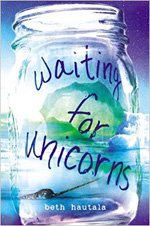 The family in this book faces a wide array of challenges as they find themselves coping with loss and transitions. After the death of her mother, 12-year-old Talia finds herself in Churchill (in Manitoba, Canada) with her father who is doing research on beluga whales on the Arctic ice. Talia finds comfort by focusing on searching for a Narwhal (unicorn whale), collecting wishes in a secret jar, and reading fairy tales she shared with her mother. Her father’s research keeps him away for months at a time and now instead of spending that time with her mom, Talia is living with an Inuit woman named Sura. Sura is a storyteller who helps Talia as she grieves, reconnects with her father, and acclimates to her surroundings.
The family in this book faces a wide array of challenges as they find themselves coping with loss and transitions. After the death of her mother, 12-year-old Talia finds herself in Churchill (in Manitoba, Canada) with her father who is doing research on beluga whales on the Arctic ice. Talia finds comfort by focusing on searching for a Narwhal (unicorn whale), collecting wishes in a secret jar, and reading fairy tales she shared with her mother. Her father’s research keeps him away for months at a time and now instead of spending that time with her mom, Talia is living with an Inuit woman named Sura. Sura is a storyteller who helps Talia as she grieves, reconnects with her father, and acclimates to her surroundings.
—LC
Raidt, Gerda. (2015). In the New World: A Family in Two Centuries. Illus. by Christa Holtei.
Trans. by Suzi Woofter. Watertown, MA: Charlesbridge.
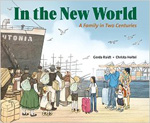 In this well-written informational book, readers go to the 19th century where Peter’s family decides to leave Germany for the United States. After a long and arduous journey, the family settles and turns their land into a prosperous farm that thrives and supports the family for many generations. The author provides a great deal of factual information to underscore both the difficulties and rewards of their necessary journey. The present-day family, now 150 years later, wants to discover more information about their family heritage and background. They travel to Germany to locate the family’s original village and piece together parts of the puzzle to appreciate their history. Through well-crafted language, organization, and beautiful detailed illustrations, this book will enhance social studies explorations about immigration and family history.
In this well-written informational book, readers go to the 19th century where Peter’s family decides to leave Germany for the United States. After a long and arduous journey, the family settles and turns their land into a prosperous farm that thrives and supports the family for many generations. The author provides a great deal of factual information to underscore both the difficulties and rewards of their necessary journey. The present-day family, now 150 years later, wants to discover more information about their family heritage and background. They travel to Germany to locate the family’s original village and piece together parts of the puzzle to appreciate their history. Through well-crafted language, organization, and beautiful detailed illustrations, this book will enhance social studies explorations about immigration and family history.
—MN
Ages 12–14
Rhodes, Jewell Parker. (2015). Bayou Magic. New York, NY: Little, Brown.
 In this beautifully crafted novel, readers meet Maddy, the youngest of the siblings who take turns spending the summer with her Grandmère Lavalier. As Maddy prepares for her first summer visit, she does so with both excitement and trepidation.
In this beautifully crafted novel, readers meet Maddy, the youngest of the siblings who take turns spending the summer with her Grandmère Lavalier. As Maddy prepares for her first summer visit, she does so with both excitement and trepidation.
At the onset of her journey, Maddy’s inner senses are beginning to awaken. Upon meeting her Grandmère, she notices her quiet sadness and worries, but over the summer, she learns about healing herbs and listens to tales about her family heritage. She meets a local boy named Bear who takes her on numerous adventures to explore the area. Not far from the bayou is a large oil rig where some men work. After an unfortunate oil explosion kills Bear’s father and harms some of the bayou animals, Maddy’s courage and selfless acts of kindness (along with her special gifts) help to bring the community together to save the landscape. Middle-grade readers will certainly enjoy the blend of folklore magic and lyrical storytelling. The novel provides opportunities to discuss themes of empowerment, community, death, and environmentalism.
—MN
Yeh, Kat. (2015). The Truth About Twinkie Pie. New York, NY: Little, Brown.
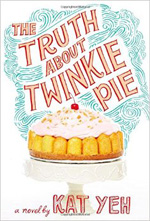 As sisters, GiGi and DiDi struggle with typical issues of getting along, but in this story they are also facing larger challenges related to social status and family secrets. After DiDi wins a million dollars on a cooking show contest, GiGi finds herself moving from a trailer park in South Carolina to a prep school in Long Island, NY. This transition is not easy for the obvious reasons and GiGi falls into the usual traps, making enemies of a popular girl by making friends with the coolest guy in school. The charm of this book lies in the recipes sprinkled throughout, both “recipes for success” and cooking recipes. These elements add humor and playfulness to a story that also features quite a bit of mystery and conflict as GiGi discovers her mother is not dead (as she was told). This book offers a lovely reflection on the meaning of family, how food traditions connect us, and why we search for the truth.
As sisters, GiGi and DiDi struggle with typical issues of getting along, but in this story they are also facing larger challenges related to social status and family secrets. After DiDi wins a million dollars on a cooking show contest, GiGi finds herself moving from a trailer park in South Carolina to a prep school in Long Island, NY. This transition is not easy for the obvious reasons and GiGi falls into the usual traps, making enemies of a popular girl by making friends with the coolest guy in school. The charm of this book lies in the recipes sprinkled throughout, both “recipes for success” and cooking recipes. These elements add humor and playfulness to a story that also features quite a bit of mystery and conflict as GiGi discovers her mother is not dead (as she was told). This book offers a lovely reflection on the meaning of family, how food traditions connect us, and why we search for the truth.
—LC
Ages 15 +
Coyle, Katie. (2014). Vivian Apple at the End of the World. New York, NY: Houghton Mifflin Harcourt.
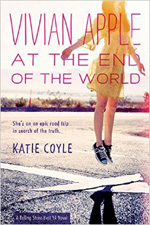 Originally published in England, this book is set in Pittsburgh, PA as Rapture Day approaches.
Originally published in England, this book is set in Pittsburgh, PA as Rapture Day approaches.
Vivian and her best friend, Harp, are nonbelievers who do not conform to the fundamentalism of the Church of America. Their parents, however, do, and have disappeared according to the church leader’s prophecy—along with several thousand others. Vivian is a good-natured teenager, struggling with the most typical dilemmas of friendship, crushes, and family. When she is thrown into a dangerous and mysterious situation, she remains hopeful that her parents have not disappeared, and readers travel with her as she investigates possible alternatives to the Rapture. This engaging novel reads as much like a coming-of-age story with a political twist as it does like an apocalyptic tale.
—LC
Mary Napoli is an associate professor of Reading and Children's Literature. She received her PhD in Curriculum and Instruction with an emphasis in Language and Literacy Education with a minor in women's studies from The Pennsylvania State University. She has published numerous books, articles, book chapters, and professional resource materials pertaining to children's literature. She is a former kindergarten and first grade teacher. Lesley Colabucci is an associate professor of early childhood and special education at Millersville University in Pennsylvania. Her research work includes children’s literature and elementary education.